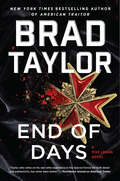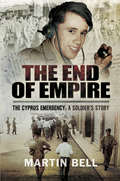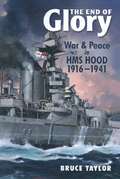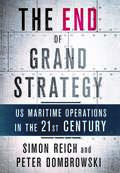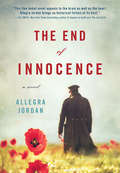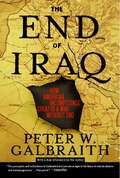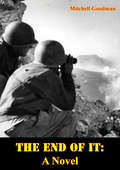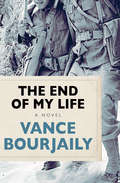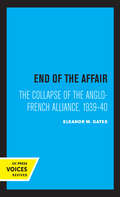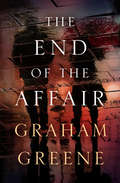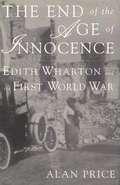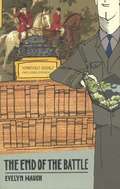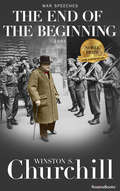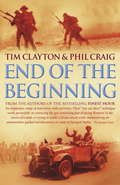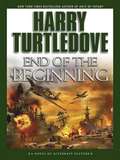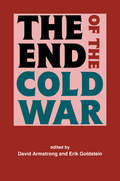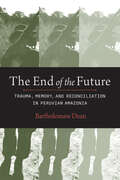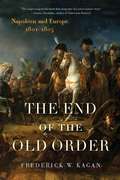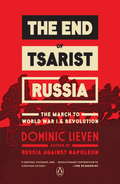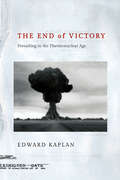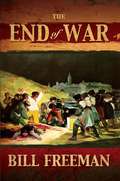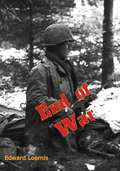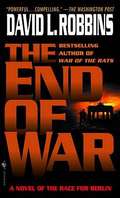- Table View
- List View
End of Days: A Pike Logan Novel (Pike Logan #16)
by Brad TaylorPike Logan must stop a deranged killer hell-bent on igniting an international conflagration in this explosive, action-packed thriller from New York Times bestselling author and former special forces officer, Brad Taylor.When a paragliding trip over the picturesque mountains of Switzerland results in the brutal murder of the former head of Israeli intelligence, Mossad brings in terrorist hunters Aaron and Shoshana to investigate. But they'll need help to find out who was behind the attack and what they’re planning next. Luckily, Aaron and Shoshana know exactly who to call.Taskforce operators Pike Logan and Jennifer Cahill have been trapped in Charleston, South Carolina during COVID-19, so when Aaron and Shoshana show up on their doorstep with Israeli passports and a new mission, they jump at the chance to assist their friends. Some suspect that Keta’ib Hezbollah, an Iranian-funded militia group operating in Iraq, might be responsible for the “accidental” deaths of key members of the American and Israeli governments. But something isn’t adding up, and Pike, Jennifer, and the two Mossad operators are determined to find the real assassins before more people are cut down.As they stumble upon the trail of a serial killer loose on the streets of Rome connected to the deaths and follow evidence leading to the exalted Knights of Malta, they must wade deep into the contentious religious and political fractures of Israel and the greater Middle East. It’s a dangerous world where fanatics and legitimate organizations exist side by side, and it’s up to the Taskforce to determine who is really pulling the strings. What they find could have disastrous consequences not only for them, but for the entire world…
The End of Empire: Cyprus: A Soldier's Story
by Martin Bell OBEMartin Bell, the former BBC was reporter and Independent MP, served as a soldier in the Suffolk Regiment during the Cyprus emergency between 1957 and 1959. In a chocolate box in the attic many years later he found more than 100 letters that he had sent home to his family. He was not a journalist then, but the letters give a vivid impression of what it was like to be a conscript on active service during the EOKA rebellion against British rule. They describe road blocks and cordons and searches, murders and explosions and riots and a strategy of armed repression that ultimately failed. From this beginning he has written The End of Empire.His narrative is a powerful and personal account of the violent process of decolonization, of the character of the British Army at the time and the impact of National Service on young men who were not much more than kids in uniform. It also gives a graphic insight into the ultimate futility of the use of force in wars among people and it reveals the true story of the insurgency and the campaign to defeat it.By drawing on recently declassified documents, he shows that Cyprus in the late 1950s was run not by the governor but by a military junta. The army commanders were looking for the knockout blow that would deliver victory, but their misguided tactics served only to strengthen support for their enemy.So The End Of Empire is much more than a personal reminiscence. It is an absorbing account of the experience of army life from the perspective of a private soldier, and it is the inside story of how Britain tried to crush a violent rebellion sixty years ago.
The End of Glory: War & Peace in HMS Hood 1916-1941
by Bruce TaylorThe career of the legendary British battlecruiser is vividly recounted from its commissioning to its tragic end in this naval history. The HMS Hood was the glory of the Royal Navy. In The End of Glory, historian Bruce Taylor combines in-depth research and thrilling narrative to tell its story. For twenty years Hood symbolized the Royal Navy during the twilight years of the British Empire. Yet in 1941, it was destroyed in seconds by the battleship Bismarck, a catastrophe that shattered the morale the British public. Through official documents as well as the personal accounts and reminiscences of more than 150 crewmen, this volume offers a vivid portrait of this naval icon. An insider&’s view of a warship in peace and war, The End of Glory not only paints an intimate picture of everyday life but deals with controversial issues such as the Invergordon mutiny, escapades ashore and afloat, the Christmas mutiny of 1940 and the terrible conditions onboard in war. This coverage, based on so many original sources, makes for a truly compelling story that neither historian, enthusiast nor general reader will find easy to put down.
The End of Grand Strategy: US Maritime Operations in the Twenty-First Century
by Simon Reich Peter DombrowskiIn The End of Grand Strategy, Simon Reich and Peter Dombrowski challenge the common view of grand strategy as unitary. They eschew prescription of any one specific approach, chosen from a spectrum that stretches from global primacy to restraint and isolationism, in favor of describing what America’s military actually does, day to day. They argue that a series of fundamental recent changes in the global system, the inevitable jostling of bureaucratic politics, and the practical limitations of field operations combine to ensure that each presidential administration inevitably resorts to a variety of strategies. Proponents of different American grand strategies have historically focused on the pivotal role of the Navy. In response, Reich and Dombrowski examine six major maritime operations, each of which reflects one major strategy. One size does not fit all, say the authors—the attempt to impose a single overarching blueprint is no longer feasible. Reich and Dombrowski declare that grand strategy, as we know it, is dead. The End of Grand Strategy is essential reading for policymakers, military strategists, and analysts and critics at advocacy groups and think tanks.
The End of Innocence
by Allegra JordanOn the eve of WWI, two students fall in love in Harvard's hallowed halls and must face a world at war from opposing sides Helen Windship Brooks is struggling to find herself at the world-renowned Harvard-Radcliffe University when brooding German poet Wils bursts into her life. As they fall deeply in love on the brink of WWI, anti-German sentiments mount and Wils' future at Harvard-and in America-is in increasing danger. When Wils is called to fight for the Kaiser, Helen must decide if she is ready to fight her own battle for what she loves most. From Harvard's hallowed halls to Belgium's war-ravaged battlefields, The End of Innocence is a powerful new vision of finding love and hope in a violent, broken world.
The End of Iraq: How American Incompetence Created a War without End
by Peter W. GalbraithThe End of Iraq, definitive, tough-minded, clear-eyed, describes America's failed strategy toward that country and what must be done now. The United States invaded Iraq with grand ambitions to bring it democracy and thereby transform the Middle East. Instead, Iraq has disintegrated into three constituent components: a pro-western Kurdistan in the north, an Iran-dominated Shiite entity in the south, and a chaotic Sunni Arab region in the center. The country is plagued by insurgency and is in the opening phases of a potentially catastrophic civil war. George W. Bush broke up Iraq when he ordered its invasion in 2003. The United States not only removed Saddam Hussein, it also smashed and later dissolved the institutions by which Iraq's Sunni Arab minority ruled the country: its army, its security services, and the Baath Party. With these institutions gone and irreplaceable, the basis of an Iraqi state has disappeared. The End of Iraq describes the administration's strategic miscalculations behind the war as well as the blunders of the American occupation. There was the failure to understand the intensity of the ethnic and religious divisions in Iraq. This was followed by incoherent and inconsistent strategies for governing, the failure to spend money for reconstruction, the misguided effort to create a national army and police, and then the turning over of the country's management to Republican political loyalists rather than qualified professionals. As a matter of morality, Galbraith writes, the Kurds of Iraq are no less entitled to independence than are Lithuanians, Croatians, or Palestinians. And if the country's majority Shiites want to run their own affairs, or even have their own state, on what democratic principle should they be denied? If the price of a unified Iraq is another dictatorship, Galbraith writes in The End of Iraq, it is too high a price to pay. The United States must focus now, not on preserving or forging a unified Iraq, but on avoiding a spreading and increasingly dangerous and deadly civil war. It must accept the reality of Iraq's breakup and work with Iraq's Shiites, Kurds, and Sunni Arabs to strengthen the already semi-independent regions. If they are properly constituted, these regions can provide security, though not all will be democratic. There is no easy exit from Iraq for America. We have to relinquish our present strategy -- trying to build national institutions when there is in fact no nation. That effort is doomed, Galbraith argues, and it will only leave the United States with an open-ended commitment in circumstances of uncontrollable turmoil. Peter Galbraith has been in Iraq many times over the last twenty-one years during historic turning points for the country: the Iran-Iraq War, the Kurdish genocide, the 1991 uprising, the immediate aftermath of the 2003 war, and the writing of Iraq's constitutions. In The End of Iraq, he offers many firsthand observations of the men who are now Iraq's leaders. He draws on his nearly two decades of involvement in Iraq policy working for the U. S. government to appraise what has occurred and what will happen. The End of Iraq is the definitive account of this war and its ramifications.
The End Of It: A Novel (classic Reprint)
by Mitchell Goodman2nd Lieut. Mitchell Goodman's experiences form the basis for this vivid 1961 anti-war novel. The story focuses on an American artillery lieutenant, assimilated into the massive Allied invasion force, who is forced to re-examine his life and his beliefs by his experiences in beautiful but war-torn Italy.
The End of My Life: A Novel
by Vance BourjailyVance Bourjaily's classic novel of World War II dramatizes an entire generation's loss of innocence When Thomas "Skinner" Galt leaves Greenwich Village to volunteer as an ambulance driver with the British Army, he anticipates the adventure of a lifetime. What he fails to understand is that no matter where he comes from or how many books he has read, once he dons a military uniform, his life will cease to be his own. Stationed first in the Middle East and then in Italy, Skinner and his fellow American volunteers, Rod, Freak, and Benny, endure boredom, fear, and the exquisite frustration of following orders. They seek solace in their friendship with one another and in the debauched diversions available to men during wartime. But as the days and nights drag on, Skinner begins to drift away from his comrades--and from himself. Too late, he discovers that the path he has chosen leads only to tragedy. Inspired by Vance Bourjaily's experiences as an ambulance driver in the American Field Service and commissioned by legendary editor Maxwell Perkins, The End of My Life marked the arrival of a writer heralded by the New York Times as "a Dostoevsky of the generation that came of age in World War II." Elegant, spare, and fiercely honest, this is a timeless portrait of the devastating effects of war on the human spirit.
End of the Affair: The Collapse of the Anglo-French Alliance, 1939 - 40
by Eleanor M. GatesThis title is part of UC Press's Voices Revived program, which commemorates University of California Press’s mission to seek out and cultivate the brightest minds and give them voice, reach, and impact. Drawing on a backlist dating to 1893, Voices Revived makes high-quality, peer-reviewed scholarship accessible once again using print-on-demand technology. This title was originally published in 1981.
The End of the Affair (Virago Modern Classics #Vol. 13)
by Graham GreeneGraham Greene’s masterful novel of love and betrayal in World War II London is “undeniably a major work of art” (The New Yorker). Maurice Bendrix, a writer in Clapham during the Blitz, develops an acquaintance with Sarah Miles, the bored, beautiful wife of a dull civil servant named Henry. Maurice claims it’s to divine a character for his novel-in-progress. That’s the first deception. What he really wants is Sarah, and what Sarah needs is a man with passion. So begins a series of reckless trysts doomed by Maurice’s increasing romantic demands and Sarah’s tortured sense of guilt. Then, after Maurice miraculously survives a bombing, Sarah ends the affair—quickly, absolutely, and without explanation. It’s only when Maurice crosses paths with Sarah’s husband that he discovers the fallout of their duplicity—and it’s more unexpected than Maurice, Henry, or Sarah herself could have imagined. Adapted for film in both 1956 and 1999, Greene’s novel of all that inspires love—and all that poisons it—is “singularly moving and beautiful” (Evelyn Waugh).
The End of the Age of Innocence: Edith Wharton and the First World War
by Alan PriceThis book provides an overview of Wharton's life during World War II and how the war affected her writing and world-view. This book includes extensive new information on Wharton - based upon her unpublished letters, archival materials, and the extensive research by the author.
The End of the Age of Innocence: Edith Wharton and the End of the First World War
by Alan PriceEvaluation of her work.
The End of the Battle (Sword of Honour Trilogy #3)
by Evelyn WaughGuy Crouchback is given one final assignment in Yugoslavia, at the end of WWII. Concluding volume of the Sword of Honour trilogy.
The End of the Beginning: 1943 (Winston S. Churchill War Speeches)
by Winston S. ChurchillThis collection of WWII speeches by the Nobel Prize-winning Prime Minister reflect his determination in the face of a fearsome enemy. 1942 was an important turning point in World War II. Britain and its allies had faced considerable challenges thus far. Beset by bombings and devastated by personal loss and the restrictions of war, the British public was losing patience with the war effort—and their prime minister. This collection of Winston Churchill&’s wartime speeches from 1942 provides an enlightening commentary on this volatile time in history from the point of view of one of its most prominent leaders. Churchill faced an uphill battle in his military efforts as well as in gathering political and public support for the struggle to come. But the tides had turned when the United States joined the war at the end of 1941. Churchill has been quoted as saying he felt certain of the Allied victory with the US on his side—and his speeches reflect this renewed sense of hope and conviction.
End of the Beginning
by Phil Craig Tim Clayton1942 - British troops are stranded in the desert, struggling to hold back Rommel's Afrika Corps. Hitler's armies have reached Moscow, and there are murmurs of discontent at home as new doubts emerge about Churchill's leadership. Elsewhere in Europe there is chilling evidence of the mounting persecution of the Jews, stretching from Poland to the Channel Islands. For many, it seems there is little hope. As in their acclaimed bestseller FINEST HOUR, the authors use the personal testimony of ordinary people - In END OF THE BEGINNING we meet again some of the people first encountered in FINEST HOUR, and get to know many more. Troops fighting for Montgomery in the desert, RAF pilots bombing German towns, a young Jewish woman deported to Auschwitz from Guernsey, the reality of the Home Front - these stories and many more paint a vivid picture of human endeavour in time of war. And, sixty years on from the Battle of Alamein, END OF THE BEGINNING tells the controversial truth about one of the most famous battles in history - the importance of its lesser-known predecessor and the months of bitter in-fighting between the Allied generals. With precision and compassion, Phil Craig and Tim Clayton again debunk the myths and explore the realities of a crucial year in the history of Britain.
End of the Beginning (Pacific War Series #2)
by Harry TurtledoveSix weeks ago, Imperial Japanese military forces conquered and occupied the Hawaiian Islands. A puppet king sits on Hawaii's throne, his strings controlled by the general of the invasion force. American POWs, malnourished and weak, are enslaved as hard laborers until death takes them. Civilians fare little better, struggling to survive on dwindling resources. And families of Japanese origin find their loyalties divided. Meanwhile, across the United States, from Pensacola, Florida, to San Diego, California, the military is marshaling its forces. Steel factories and fuel refineries are operating around the clock. New recruits are enlisting, undergoing rigorous training exercises. All for the opportunity to strike back and drive the enemy from American soil...
The End of the Cold War
by David Armstrong Erik GoldsteinGiving an overview of the origins and history of the Cold War, this work considers whether the Cold War is truly over, and what the effects have been on Europe, and the former Soviet Union, as well as US foreign policy.
The End of the Future: Trauma, Memory, and Reconciliation in Peruvian Amazonia
by Bartholomew DeanIn The End of the Future, author Bartholomew Dean broadens the theoretical framework for understanding memory's role in reconciliation following a violent conflict. This book explores the complicated and confusing linkages between memory and trauma for individuals caught up in civil war and post-conflict reconciliation in the Peruvian Amazon's Huallaga Valley—an epicenter for leftist rebels and a booming shadow economy based on the extraction and circulation of cocaine. The End of the Future tells the story of violent attempts by the Túpac Amaru Revolutionary Movement (Movimiento Revolucionario Túpac Amaru, MRTA) to overthrow the state in the late 1980s and early 1990s from the perspective of the poorest residents of the lower Huallaga's Caynarachi Basin. To give context to the causes and consequences of the MRTA's presence in the lower and central Huallaga, this book relies on the written works and testimony of Sístero García Torres, an MRTA rebel commander; the government's Truth and Reconciliation Commission; MRTA propaganda; media accounts; and critical historical texts. Besides exposing Huallaga Valley human rights abuses, the book's contribution to political anthropology is consequential for its insistence that reconciliation is by no means equivalent to local, Indigenous notions of "justice" or customary forms of dispute resolution. Without deliberately addressing the diverse socio-cultural contours defining overlapping epistemologies of justice, freedom, and communal well-being, enduring reconciliation will likely remain elusive.
End of the Game (Destroyer #60)
by Richard Sapir Warren MurphyWhen a California Video game programmer gets board he begins manipulating people's lives for fun. When his boardom, leads him into an attempt at neuclear war, Remo is sent in to provide entertainmet.
The End of the Old Order: Napoleon and Europe, 1801-1805
by Frederick KaganPerhaps no person in history has dominated his or her own era as much as Napoleon. Despite his small physical stature, the shadow of Napoleon is cast like a colossus, compelling all who would look at that epoch to chart their course by reference to him. For this reason, most historical accounts of the Napoleonic era-and there are many-tell the same Napoleon-dominated story over and over again, or focus narrowly on special aspects of it. Frederick Kagan, distinguished historian and military policy expert, has tapped hitherto unused archival materials from Austria, Prussia, France, and Russia, to present the history of these years from the balanced perspective of all of the major players of Europe. InThe End of the Old Orderreaders encounter the rulers, ministers, citizens, and subjects of Europe in all of their political and military activity-from the desk of the prime minister to the pen of the ambassador, from the map of the general to the rifle of the soldier. With clear and lively prose, Kagan guides the reader deftly through the intriguing and complex web of international politics and war. The End of the Old Orderis the first volume in a new and comprehensive four-volume study of Napoleon and Europe. Each volume in the series will surprise readers with a dramatically different tapestry of early nineteenth-century personalities and events and will revise fundamentally our ages-old understanding of the wars that created modern Europe.
The End of Tsarist Russia: The March to World War I and Revolution
by Dominic LievenAn Economist Best Book of the YearA Financial Times Best Book of the YearWinner of the the Pushkin House Russian Book PrizeFinalist for the Lionel Gelber PrizeAn Amazon Best Book of the Month (History)One of the world's leading scholars offers a fresh interpretation of the linked origins of World War I and the Russian Revolution"Lieven has a double gift: first, for harvesting details to convey the essence of an era and, second, for finding new, startling, and clarifying elements in familiar stories. This is history with a heartbeat, and it could not be more engrossing."--Foreign AffairsWorld War I and the Russian Revolution together shaped the twentieth century in profound ways. In The End of Tsarist Russia, acclaimed scholar Dominic Lieven connects for the first time the two events, providing both a history of the First World War's origins from a Russian perspective and an international history of why the revolution happened. Based on exhaustive work in seven Russian archives as well as many non-Russian sources, Dominic Lieven's work is about far more than just Russia. By placing the crisis of empire at its core, Lieven links World War I to the sweep of twentieth-century global history. He shows how contemporary hot issues such as the struggle for Ukraine were already crucial elements in the run-up to 1914. By incorporating into his book new approaches and comparisons, Lieven tells the story of war and revolution in a way that is truly original and thought-provoking.From the Hardcover edition.
The End of Victory: Prevailing in the Thermonuclear Age
by Edward KaplanThe End of Victory recounts the costs of failure in nuclear war through the work of the most secret deliberative body of the National Security Council, the Net Evaluation Subcommittee (NESC). From 1953 onward, US leaders wanted to know as precisely as possible what would happen if they failed in a nuclear war—how many Americans would die and how much of the country would remain. The NESC told Presidents Dwight Eisenhower and John F. Kennedy what would be the result of the worst failure of American strategy—a maximum-effort surprise Soviet nuclear assault on the United States. Edward Kaplan details how NESC studies provided key information for presidential decisions on the objectives of a war with the USSR and on the size and shape of the US military. The subcommittee delivered its annual reports in a decade marked by crises in Berlin, Quemoy and Matsu, Laos, and Cuba, among others. During these critical moments and day-to-day containment of the USSR, the NESC's reports offered the best estimates of the butcher's bill of conflict and of how to reduce the cost in American lives.Taken with the intelligence community's assessment of the probability of a surprise attack, the NESC's work framed the risks of US strategy in the chilliest years of the Cold War. The End of Victory reveals how all policy decisions run risks—and ones involving military force run grave ones—though they can rarely be known with precision.
The End of War
by Bill FreemanThe End of War is a study of war and the possibility of peace. In the past empires used war and the threat of war as a way to dominate and exploit others, but in the modern world that is no longer possible. A new multi-lateral world is emerging where all nations will be required to ensure peace. Wars are diminishing but it will require a major effort if we are to go the final step to bring an end to the violence.
End of War
by Edward LoomisHe came from Ohio. Young, unsure of himself, innocent. He came to Europe as an infantryman battling his way into the heart of Germany.There he stopped being unsure of himself. He stopped when he first went into battle and heard the singing of bullets close overhead, heard the crump of the four-inch mortars and saw the Tiger tanks rumbling towards him.He grew to maturity when he killed his first German and he stopped being innocent when he bought his first woman...for a bar of chocolate.When the war ended and the fighting died away, how was he to regain his lost innocence? How was he to lose the habits of a killer?There was no one to help him except Chrystel, the refugee with the body of a girl and the heart of a woman. No one but Chrystel...and himself.
The End of War: A Novel of the Race for Berlin
by David L. RobbinsIn the final months of the Second World War, one strategic question above all occupies the Allies: which liberating army will be the first to march into Berlin? On the western front, Montgomery lobbies for the honour, while Eisenhower becomes more and more determined to thwart him and put an American general -- Bradley or Patton -- in charge of the final thrust; in the east, Stalin's armies advance steadily and ruthlessly towards the apotheosis of their vengeance.
